A Maltese is a great family pet with a soft silky coat that does not shed very much.They are very lively with great energy level. This breed of dog is very sweet, gentle and intelligent. They are very fast learners. These dogs are to be handled with care as they are bit introverted and need regular socializing with strangers.
Training at home may be a bit difficult, but with a little patience, time and commitment you can easily train your Maltese better than a professional. Home training can improve the relation between Maltese and owner.
When first bringing a Maltese pup home, it is essential that you begin the training process right away so that you will not be paying for it later on.
Below you will find some common issues and how you can begin the teaching process at once.
Caring For Your Maltese
The Maltese dog is one of today's most beloved pets. Both rich and average households have them and they have a natural trait of love and devotion to their owners. The Maltese is usually less than 10 pounds and is covered in long, straight and silky white hair. These dogs are very sweet and lovable, however taking care of them is a bit more work than loving them. So, exactly what does it take to care for your Maltese?
Grooming Your Maltese
The Maltese dog's silky coat requires daily grooming. They do not shed so much but their coat tends to mat and get dirty. Combing your Maltese's coat daily is essential and you can get the supplies needed (combs, brush and dog shampoo) at any grocery store or pet shop. You will also need to bathe your Maltese often since they enjoy jumping in puddles and rolling around. Make sure that you dry your dog off completely after each bath so they do not catch pneumonia.
Another part of the Maltese that needs special grooming is their eyes. This breed of dog is susceptible to tear stain, a condition which causes the dog to have watery eyes which then form discharge at the corner of each eye. This condition causes the area under the Maltese's eyes to turn a rust color. You can keep tear stain under control by keeping the dog's hair away from their eyes (easily done by tying it back) and wiping the discharge from their eyes frequently. There are also tear stain removers out there that you can use as well.
Feeding Your Maltese
The Maltese's diet is a simple one. Although the Maltese tend to be intolerant to rich foods, by feeding your dog three small portions of meat and vegetables along with diets rich in protein, you can expect a healthy outcome.
Your Maltese and Chewing
Chewing can be a common problem with the Maltese or any puppy for that matter.Here are some tips you can follow to alleviate the problem:
1. Spray down your furniture and carpets with deterrents such as bitter spray or cayenne pepper.
2. Refrain from giving your Maltese old shoes, slippers or furniture for toys as they will just turn to the newer ones as well. Instead, buy them dog toys that they will be certain to enjoy just as much.
3. If the chewing problem continues, you might need to restrict your Maltese to a crate when you are not going to be home. Be sure to give him toys to chew on in the crate.
Exercising Your Maltese
Maltese dogs are generally indoor dogs and are usually happy living that way. They still need their exercise though. You can keep them busy indoors with special toys and playtime on your part and you can also take them for quick walks outside daily, however this is not necessary. Most of the Maltese will get their proper exercise playing around the house.
Kids and Your Maltese
Maltese dogs are very fragile and can easily get injured. It is important to watch your children around your little dog. Small things such as "big hugs", playful wrestling and handling the dog too roughly can easily cause broken bones. It is important that you set down rules with your kids if you are going to have a Maltese. Explain to them the importance of being gentle with your dog and show them how it is done. In the result of a broken bone, bring your dog to the veterinarian as soon as possible and do not leave it unattended until it heals.
These are just a few important steps to follow when caring for your Maltese. Although caring for the Maltese can get a bit tedious, it is well worth it as these dogs make very lovable pets.
Your Maltese and Barking
Barking is another common problem with the Maltese. Here are some tips you can follow to decrease the barking:
1. If your Maltese is barking because of a stranger outside, pet and praise him for alerting you of potential danger, and then tell him to be quiet. If he stops barking, immediately give him a toy or treat as a reward. Repeat the process as needed.
2. When barking is an issue due to separation anxiety (your absence), gradually teach it how to be home without you around. You can do this by leaving the house for short periods of time at first, such as walking outside your front door for a couple minutes. Then gradually increase the time. If he remains calm during this time, reward him with a treat.
3. Keep your Maltese active during the day. Play with him, take him for walks, give him plenty of toys to play with and just the basic TLC he needs. This will keep him busy and even tire him out for later napping.
Your Maltese and Potty training
Although potty training can be quite the struggle in the beginning, it is essential that you begin right away with the process. Here are some tips you can follow:
1. Get a kennel or play pen for your pup. Line one side with newspaper and the other with bedding. When your Maltese is a puppy it is difficult for them to hold their potty and therefore accidents will occur. Having the newspaper near them and available at all times will help lessen the accidents. Once they get older, they will no longer want to sleep where they potty. This is also where you want to keep your Maltese pup when you are not home.
2. If you spot your pup getting ready to go in your house, pick it up and bring it to the newspaper quickly. Reward it after it is done. Repeat as much as necessary.
3. Once your Maltese has had it's third set of shots, you can begin the potty training sessions outside. This is easily done by moving the newspaper outside until it gets used to going outside.
These are a few training tips you can follow for your new Maltese.
Following these tips consistently and showing your dog lots of affection is key to a happy, healthy Maltese.

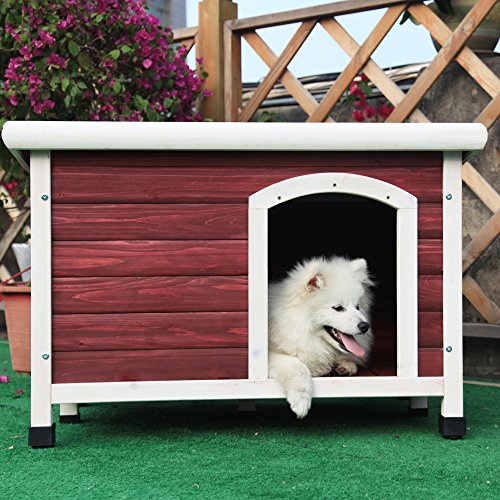 Cute Dog Houses
Our pets are part of the fam
Cute Dog Houses
Our pets are part of the fam
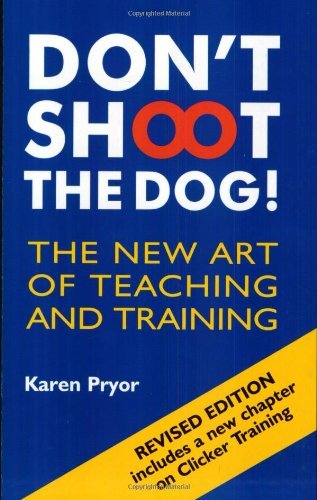 My Dog Jumps Up On People
The doorbell rings and next
My Dog Jumps Up On People
The doorbell rings and next
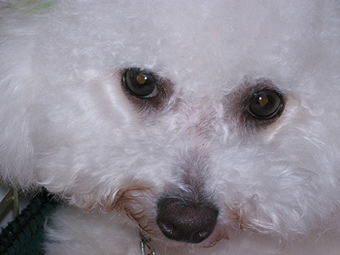 Top 10 Dogs for Apartment Living - Ten dog breeds that do well in apartments
The Top 10 Dogs for Apartment Living
“What dog will d
Top 10 Dogs for Apartment Living - Ten dog breeds that do well in apartments
The Top 10 Dogs for Apartment Living
“What dog will d
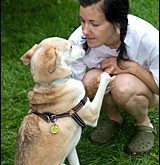 Dog Tricks – Dog Training Level 1
Dog Tricks – Dog Training Le
Dog Tricks – Dog Training Level 1
Dog Tricks – Dog Training Le
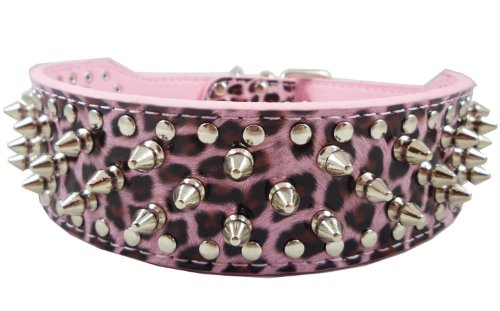 Designer Dog Collars
Your dog can be stylish too!
Designer Dog Collars
Your dog can be stylish too!